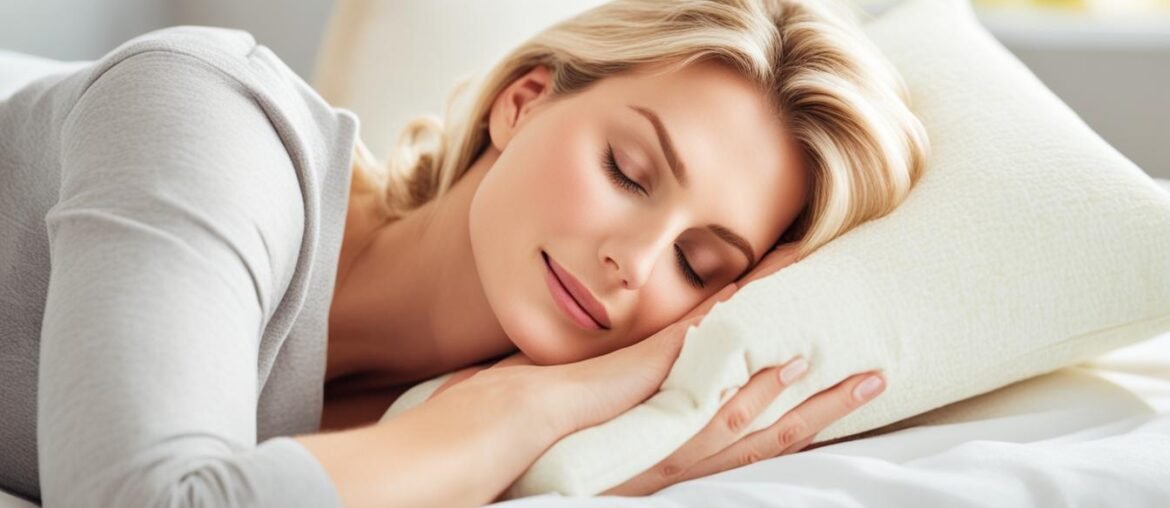Did you know that lack of sleep can accelerate the aging process of your skin? It’s true! Sleep plays a crucial role in maintaining skin health and promoting a youthful appearance. In fact, chronic poor sleep quality has been found to have negative effects on skin function and visible signs of aging.
Research has shown that good quality sleepers have lower intrinsic skin aging scores and better recovery of the skin barrier after damage compared to poor quality sleepers. This means that getting sufficient sleep can help slow down the aging process and keep your skin looking younger for longer. Additionally, individuals who prioritize sleep report higher satisfaction with their appearance, further highlighting the importance of quality rest for skin health.
Key Takeaways:
- Adequate sleep is essential for maintaining skin health and slowing down the aging process.
- Chronic poor sleep quality can negatively impact skin function and lead to visible signs of aging.
- Good quality sleepers have lower intrinsic skin aging scores and better skin barrier recovery.
- Getting sufficient sleep can enhance your overall appearance and increase satisfaction with your skin.
- Make sleep a priority as part of your skincare routine to maintain a youthful and vibrant complexion.
The Effects of Sleep Deprivation on Skin
Sleep deprivation can have detrimental effects on the skin, compromising its rejuvenation and overall health. The lack of sufficient sleep can disrupt the skin’s natural functions and impede its ability to repair and replenish itself. This can result in various skin concerns and signs of aging that affect your appearance.
One of the effects of sleep deprivation is an increased transepidermal water loss, which means that the skin loses more moisture than it can retain. This leads to dryness and dehydration, making the skin appear dull and lacking in radiance. Inadequate moisture levels can also hinder the skin’s ability to repair itself, prolonging the healing process and exacerbating any existing skin conditions.
Sleep deprivation also impairs the recovery of the skin barrier after damage, leaving it more vulnerable to environmental stressors and irritants. This weakened barrier function can result in redness, sensitivity, and increased inflammation. Additionally, the skin’s ability to bounce back from exposure to ultraviolet (UV) light is compromised, leading to a higher risk of sunburn and sun damage.
Furthermore, sleep deprivation can contribute to the appearance of wrinkles, fine lines, and dark circles under the eyes. Chronic lack of sleep disrupts the body’s natural production of collagen and elastin, two proteins essential for maintaining the skin’s elasticity and firmness. This can result in sagging skin and the formation of wrinkles. Dark circles under the eyes are also exacerbated by sleep deprivation due to dilated blood vessels and paler skin tone.
It is worth noting that sufficient sleep is often referred to as “beauty sleep” for a reason. When you get enough sleep, your body and skin have the opportunity to rejuvenate and repair themselves. The skin undergoes a natural rejuvenation process during sleep, allowing it to recover from daily stressors and maintain its health and appearance.
“Sleep deprivation compromises the skin’s natural functions, leading to dryness, weakened barrier function, and increased signs of aging.”
To maintain healthy skin and minimize the effects of sleep deprivation, it is crucial to prioritize regular, quality sleep. Establishing a consistent sleep routine, creating a comfortable sleep environment, and practicing good sleep hygiene can all contribute to improved sleep quality and promote skin rejuvenation. Additionally, incorporating a skincare routine that includes effective moisturization, protection from UV rays, and targeted treatments can help mitigate the negative effects of sleep deprivation on the skin.
By prioritizing sleep and adopting a comprehensive skincare approach, you can support your skin’s natural rejuvenation processes, enhance its overall health, and achieve a radiant, youthful complexion.
The Link Between Sleep and Skin Rejuvenation
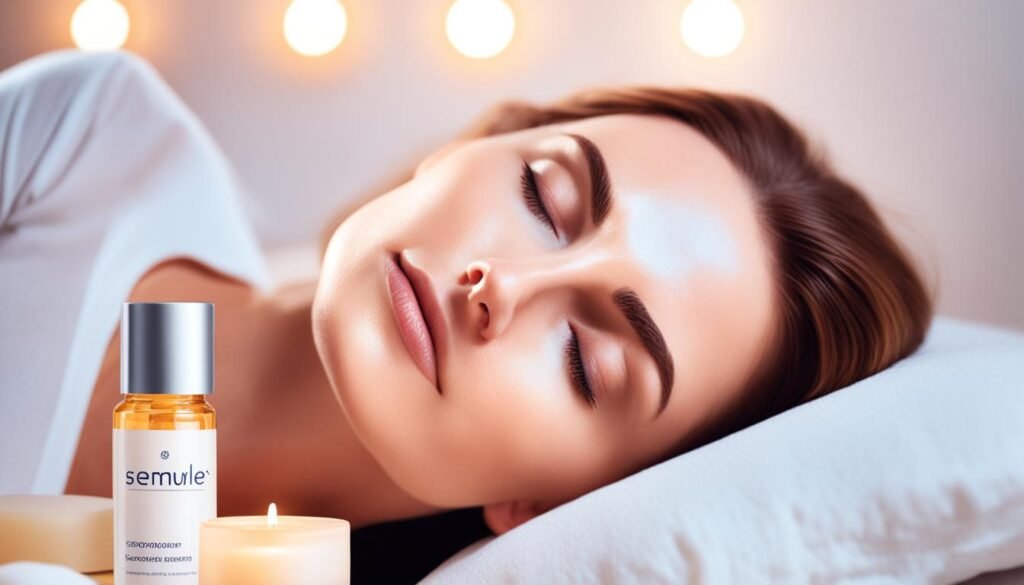
Sleep plays a crucial role in achieving skin rejuvenation. During sleep, our bodies undergo essential repair processes that contribute to maintaining healthy skin. One of the key benefits of sleep is the promotion of growth hormone production, which aids in muscle growth and cell rebuilding. This hormone also plays a vital role in enhancing the skin’s rejuvenation process.
Establishing a consistent skincare routine is equally important to maximize the benefits of sleep for the skin. A regular routine that includes proper cleansing, moisturizing, and protection from sun damage helps support the body’s rejuvenation process by providing the necessary nourishment and care.
| Skin Care Tips for Optimizing Sleep-Related Rejuvenation |
|---|
| 1. Wash your face before bedtime: |
| Properly cleanse your skin to remove impurities and prepare it for the rejuvenating effects of sleep. |
| 2. Use a hydrating moisturizer: |
| Moisturize your skin before going to bed to keep it hydrated and supple throughout the night. |
| 3. Apply a night cream: |
| Try using a night cream that contains ingredients specifically formulated to promote skin repair and rejuvenation. |
| 4. Protect your skin from the sun: |
| During the day, use sunscreen or wear protective clothing to shield your skin from harmful UV rays. |
| 5. Get enough sleep: |
| Aim for 7-9 hours of quality sleep each night to maximize the benefits of sleep on skin health. |
By combining a consistent skincare routine with sufficient sleep, you can amplify the rejuvenating effects and improve your overall skin health.
The Impact of Sleep on Skin Appearance
Sufficient sleep has a positive impact on skin appearance. It helps improve the skin’s overall complexion, making it appear brighter and healthier.
Sleep plays a role in maintaining clear skin by regulating the body’s internal clock and facilitating the repair of damaged skin cells.
Sleep deprivation can have detrimental effects on skin health, leading to paler skin, wrinkles, hanging corners of the mouth, drooping eyelids, swollen eyes, and dark circles under the eyes.
Proper skincare combined with sufficient sleep can help achieve and maintain a youthful and vibrant appearance.
Implementing a skincare routine that includes cleansing, moisturizing, and protecting the skin from sun damage, along with prioritizing adequate sleep, can greatly enhance the skin’s appearance and promote skin health.
The Role of Sleep in Reducing Wrinkles
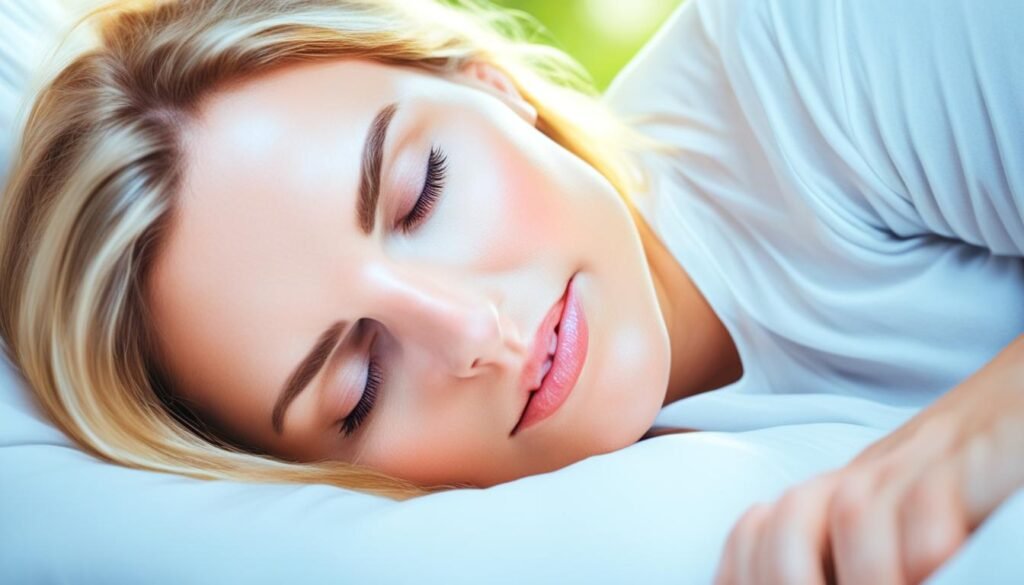
Good quality sleep plays a crucial role in reducing the formation of wrinkles. During sleep, the body produces growth hormone, which is essential for the regeneration of collagen and elastin, proteins that keep the skin elastic and flexible.
Collagen and elastin provide structure and support to the skin, helping to minimize the appearance of wrinkles and fine lines. Insufficient sleep weakens the immune system and reduces the production and quality of collagen, leading to decreased skin health and increased wrinkles.
Adequate sleep allows the body to replenish collagen levels, resulting in the reduction of wrinkles and promoting a smoother, youthful complexion.
To further emphasize the importance of sleep for skin rejuvenation, here is a comparison of the effects of good quality sleep versus sleep deprivation on wrinkles:
| Effects of Good Quality Sleep | Effects of Sleep Deprivation |
|---|---|
| Improved collagen production and quality | Reduced collagen production and quality |
| Enhanced skin elasticity | Decreased skin elasticity |
| Reduction in the appearance of wrinkles and fine lines | Increased appearance of wrinkles and fine lines |
By prioritizing quality sleep, individuals can support their skin’s rejuvenation process, reduce the formation of wrinkles, and maintain a youthful, vibrant appearance.
Sleep and Clear Skin Complexion
Sufficient sleep can have numerous benefits for achieving and maintaining a clear and healthy skin complexion. The circadian rhythm, the body’s internal clock, plays a pivotal role in controlling the behavior of the skin and regulating its functions.
During sleep, the skin experiences increased blood flow, which helps repair damaged skin cells and maintain a vibrant appearance. This enhanced blood circulation allows essential nutrients and oxygen to reach the skin, promoting its overall health and radiance.
Lack of sleep and irregular sleep patterns have been linked to undesirable changes in skin complexion. These include peeling skin, dehydration, and increased production of oily secretions that can lead to acne breakouts. Sleep deprivation can also disrupt the balance of hormones involved in regulating oil production, exacerbating skin issues.
| Effects of Sleep on Skin Complexion | Possible Consequences |
|---|---|
| Improved blood flow to the skin | Enhanced cell renewal and nourishment |
| Inadequate blood flow to the skin | Reduced skin repair and rejuvenation |
| Consistent sleep schedule | Healthy and glowing complexion |
| Irregular sleep patterns | Dull and tired-looking skin |
Prioritizing sleep and establishing a regular sleep schedule can be key in achieving a clear and glowing complexion. Alongside a consistent sleep routine, maintaining a proper skincare regimen, including gentle cleansing, regular hydration, and protection from sun damage, can further enhance the benefits of sleep on skin health.
The Impact of Sleep on Under-Eye Circles
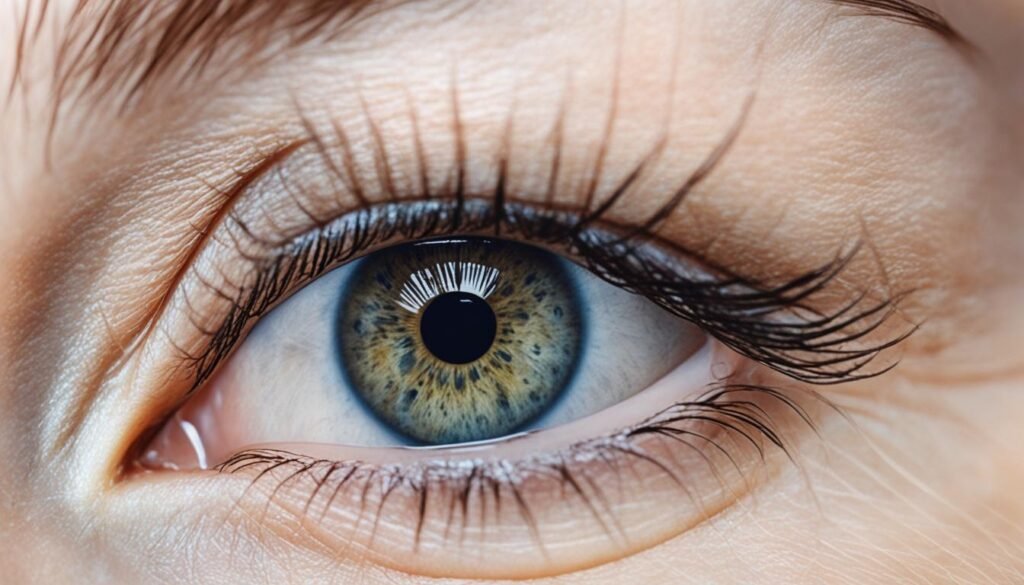
Dark circles under the eyes are a common sign of sleep deprivation. Lack of sleep can cause blood vessels under the skin to dilate, leading to dark circles and puffiness. It can also make the skin appear pale and dull, further emphasizing the appearance of under-eye circles. While sufficient sleep can help reduce the appearance of dark circles, factors such as pigmentation and skin thickness can also contribute to their presence.
Implementing proper sleep habits and using targeted skincare products can help minimize the appearance of under-eye circles. Taking care of your sleep hygiene and following a consistent sleep schedule can promote better sleep quality, reducing the likelihood of dark circles and revitalizing the skin’s appearance.
The Effects of Sleep Deprivation on Dark Circles
“Sleep deprivation affects the appearance of dark circles under the eyes. When we don’t get enough sleep, the blood vessels underneath the skin become more prominent, giving rise to dark circles. Additionally, sleep deprivation can lead to increased paleness and dullness of the skin, making the dark circles more noticeable.”
Proper self-care is crucial in combatting dark circles. By prioritizing adequate sleep and incorporating effective skincare techniques, you can revitalize your under-eye area and achieve a more refreshed and youthful look.
Sleep and Hair Health
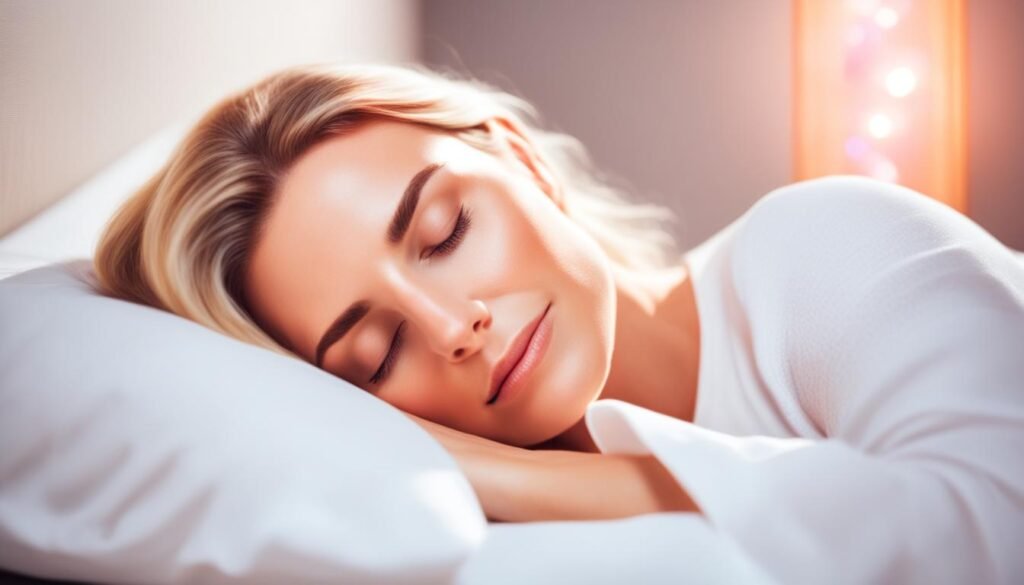
Adequate sleep is crucial for maintaining optimal hair health. Poor sleep habits and high levels of stress can have a negative impact on the condition of your hair. When you don’t get enough sleep, it can lead to increased production of sebaceous oil in the hair follicles, resulting in greasy hair that is prone to becoming weighed down and flat.
Stress, including that caused by sleep deprivation, can disrupt the hair growth cycle. It can push hair follicles into a resting phase, causing hair loss and thinning. Managing stress levels and ensuring you get enough sleep are essential for promoting healthy hair growth and maintaining lustrous locks.
Additionally, insufficient sleep can affect the body’s production of hormones that play a role in hair health. Growth hormone, which is crucial for the regeneration of collagen and elastin in the skin, also affects hair growth. Lack of sleep can reduce the production and quality of these proteins, leading to decreased hair health.
“Getting enough restorative sleep is vital for promoting healthy hair growth and maintaining the overall condition of your hair. It’s the foundation of any effective hair care routine.”
To ensure that your hair remains healthy and vibrant, it’s important to prioritize sleep as part of your daily self-care regimen. By getting enough beauty sleep and managing stress levels, you can support the natural hair growth cycle and enjoy strong, shiny, and resilient hair.
Common Hair Problems Associated with Sleep Deprivation
| Hair Problem | Description |
|---|---|
| Greasy Hair | Inadequate sleep can lead to increased production of sebaceous oil, resulting in greasy hair that appears dull and flat. |
| Hair Loss | Sleep deprivation and stress can disrupt the hair growth cycle, leading to hair loss and thinning. |
| Decreased Hair Health | Lack of sleep can impact the production of collagen and elastin, proteins essential for maintaining healthy hair. |
By understanding the connection between sleep and hair health, you can make informed choices to prioritize quality sleep and implement effective hair care routines. Remember, a good night’s sleep is not only beneficial for your overall well-being but also crucial for maintaining beautiful, healthy hair.
Tips for Getting Beauty Sleep

To ensure quality rest and promote skin rejuvenation, it’s essential to practice good sleep hygiene. By incorporating the following strategies into your routine, you can achieve beauty sleep, allowing your skin to thrive:
- Establish a regular sleep schedule: Going to bed and waking up at the same time every day helps regulate your body’s internal clock and promotes better quality sleep.
- Create a comfortable sleep environment: Make sure your bedroom is cool, dark, and quiet. Invest in a supportive mattress, cozy bedding, and consider using earplugs or eye masks if necessary.
- Exercise regularly: Engaging in physical activity during the day can help improve sleep quality. Aim for at least 30 minutes of moderate exercise most days of the week, but avoid intense workouts close to bedtime.
- Engage in relaxing activities before bedtime: Incorporate calming practices into your evening routine, such as taking a warm bath, practicing deep breathing exercises, reading a book, or listening to soothing music.
- Reduce exposure to electronic devices: The blue light emitted by screens can interfere with sleep. Power down your devices at least an hour before bedtime to allow your brain to unwind.
- Avoid lying awake in bed for prolonged periods: If you find yourself unable to fall asleep after 20-30 minutes, get out of bed and do a calming activity until you feel drowsy.
- Implement a consistent nighttime routine: Engaging in a calming routine signals to your brain that it’s time to wind down and prepare for sleep. This can include activities such as gentle stretching, practicing mindfulness or meditation, or sipping herbal tea.
By prioritizing sleep hygiene and incorporating these tips into your daily life, you can optimize the quality of your sleep, support skin rejuvenation, and wake up every morning feeling refreshed and energized.
Conclusion
Sleep is a crucial factor in maintaining skin health and achieving a youthful appearance. Chronic poor sleep quality can have detrimental effects on the skin, including increased signs of aging and compromised skin barrier function. On the other hand, individuals who prioritize good quality sleep experience lower intrinsic skin aging scores, improved skin barrier recovery, and higher self-perception of attractiveness.
Prioritizing sleep as part of a comprehensive skincare routine is essential for enhancing skin health and slowing down the aging process. Adequate sleep allows the body to undergo repair processes, promotes the production of growth hormone for cell rebuilding, and aids in fighting infection. Combining proper sleep hygiene with a consistent skincare regimen, including cleansing, moisturizing, and protecting the skin from sun damage, can greatly contribute to optimal skin rejuvenation.
Remember, lack of sleep can lead to undesirable skin effects such as wrinkles, dark circles under the eyes, and a dull complexion. By incorporating sufficient sleep into your daily routine and taking care of your skin, you can enjoy the benefits of improved skin appearance, reduced signs of aging, and overall enhanced skin health.
FAQ
Why is sleep important for the skin’s anti-aging process?
Sleep plays a significant role in maintaining skin health and slowing down the aging process. Good quality sleep promotes better recovery of the skin barrier, lower intrinsic skin aging scores, and higher satisfaction with appearance.
What are the effects of sleep deprivation on the skin?
Sleep deprivation can lead to increased signs of aging, such as wrinkles and fine lines. It also hinders the skin’s ability to repair itself and bounce back from inflammation caused by UV light exposure.
How does sleep contribute to skin rejuvenation?
During sleep, the body undergoes repair processes that aid in maintaining healthy skin. Growth hormone production increases, aiding in muscle growth and cell rebuilding. Adequate sleep allows the body to create hormones that fight infection and prevent sickness.
What impact does sleep have on skin appearance?
Sufficient sleep improves the overall complexion of the skin, making it appear brighter and healthier. It helps regulate the body’s internal clock and facilitates the repair of damaged skin cells, resulting in a clear and vibrant appearance.
How does sleep reduce the formation of wrinkles?
During sleep, the body produces growth hormone, essential for the regeneration of collagen and elastin. These proteins keep the skin elastic and flexible. Insufficient sleep weakens the immune system and reduces the production and quality of collagen, leading to increased wrinkles and fine lines.
What is the link between sleep and clear skin complexion?
Sleep regulates the behavior of the skin through the circadian rhythm. Increased blood flow to the skin during sleep aids in repairing damaged cells and maintaining a healthy complexion. Lack of sleep and late bedtimes can result in peeling skin, dehydration, and increased production of oily secretions that contribute to acne.
How does sleep impact under-eye circles?
Lack of sleep can cause blood vessels under the skin to dilate, leading to dark circles and puffiness. Sleep deprivation can also make the skin appear pale and dull, further emphasizing the appearance of under-eye circles.
What role does sleep play in hair health?
Adequate sleep is essential for maintaining optimal hair health. Poor sleep habits and high stress levels can lead to increased production of sebaceous oil in the hair follicles, resulting in greasy hair. Sleep deprivation can disrupt the hair growth cycle and contribute to hair loss.
What are some tips for getting beauty sleep?
To ensure quality rest and promote skin rejuvenation, establish a regular sleep schedule, create a comfortable sleep environment, exercise regularly, and engage in relaxing activities before bedtime. Reduce exposure to electronic devices, avoid lying awake in bed for prolonged periods, and implement a consistent nighttime routine.
How does sleep contribute to overall skin health?
Sleep plays a critical role in maintaining skin health and promoting a youthful appearance. Good quality sleepers experience improved skin barrier recovery, lower intrinsic skin aging scores, and higher self-perception of attractiveness. Prioritizing sleep as part of a comprehensive skincare routine can significantly enhance skin health and slow down the aging process.

